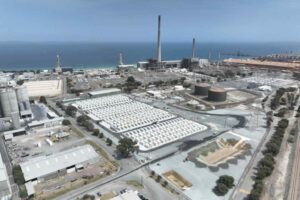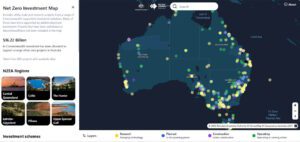The Productivity Commission has produced a 232 page Draft Report on the functioning of the 2004 National Water Initiative (NWI).
This is a report on the future of Australia, for water is our life support system in a drying continent.
The black coal industry in New South Wales and Queensland uses 383 billion litres of fresh water every year, the same as five million people.
Gas industry water usage is also prodigious. Shale gas mining uses 4 to 24 million litres in each hydraulic fracturing event which can be applied many times per well across hundreds to thousands of wells in an area.
This water use in the Surat Basin of Queensland may render the region unsustainable,and gas expansion in Queensland’s fragile regions is never ending.
For those who regularly review the environmental impact assessments for resource developments, which include the impact on essential environmental water, approval and regulation by government appears to be in a parallel universe operating light years from NWI regulations.
In 2012, in response to community concerns, the Australian Government established an Independent Expert Scientific Committee on Coal Seam Gas and Large Coal Mining Development (IESC) under the EPBC Act.
Advice is sought from the IESC by the Federal Environment Minister or by state governments.
In practice deep concerns expressed by the IESC are often disregarded by states where a single ’water expert” maybe used to contest them, or the IESC requirements are not adhered to, or not monitored, and there is no transparency in decision making.
Approval may be given by a single individual e.g. a Coordinator-General or by a committee which decides the risks “are manageable” without an explanatory statement.
The recent approval of the Olive Downs coal mine, the third largest in Queensland, on current evidence was a purely political decision which overruled all scientific advice including the Queensland’s own department of Environment and Science.
There was a highly critical assessment on surface and ground water from the IESC and on the Isaac River and its important 4000h flood plain. Permanent damage to water resources is expected.
Such event are explained in the Draft report by a Sir Humphrey Appleby like statement of obfuscation and manipulation entitled “Full incorporation of water use by mineral and petroleum industries” emanating from the NWI in 2012.
“The NWI includes a special provision for mineral and petroleum industries. It states that ‘factors specific to resource development projects, such as isolation, relatively short project duration, water quality issues, and obligations to remediate and offset impacts, may require specific management arrangements’ that are outside the scope of the agreement.
This provision was intended to provide flexibility, given the nature of mineral and petroleum industries’ water extraction requirements, such as the use of saline or hyper-saline water”.
“Most jurisdictions have incorporated mineral and petroleum industries into their entitlements and planning frameworks to some extent. In Queensland, however, alternative arrangements remain where resource tenure holders may be granted rights to take ‘associated water’ (Groundwater taken or interfered with in the course of mining activity), with the amount of water
take permitted not determined by water plans and allocations”.
In effect this is a provision for plunder of water resources particularly in Queensland.
In their submission the National Farmers’ Federation noted that the current approach has “two sets of rules” —one for farmers and the other for the resources industry’.
Indeed there are!
The Commission Draft Report recommends:-
“To improve on the entitlements framework, jurisdictions should remove exemptions for mineral and petroleum industries from water access entitlements and planning arrangements, so that these industries are subject to the same water access entitlements frameworks that apply to other consumptive users”
The management of this nation’s water resources raises the fundamental question of by whom are we being governed?
Currently it appears to be a coalition of government and fossil fuel interests with an economic system based on accumulating profit which downgrades all other considerations, including human heath. Government studiously avoids mention of health “externalities”
If civilisation survives from the increasing calamities of climate change and environmental loss it will be revealing for historians to relate how it came to be that the Coalition and Labor Parties continued to support coal and gas industries which cause so much death and misery.
Currently the shameful reasons appear to be that coal is necessary for their electoral success and that they have succumbed to lobbying and other forms of persuasion from an overwhelmingly powerful fossil fuel industry.
These industries have to die quickly if we have any chance of averting calamitous climate change.
Currently government regards deaths and illness from air pollution as a necessary price to continue their policies, and those politicians who accept that climate change is a reality must accept the death and injuries from climate change caused by fossil fuels.
There are growing health concerns about contamination of human water resources by gas mining with biologically active chemicals which have a potential to cause cancer or birth defects.
The availability or water for the coal and gas industries is in effect a hidden subsidy for these industries to produce an uneconomic and unhealthy product which is underpriced by competitive energy resources.
Water policy is a free pass for the fossil industries and a hospital pass for many communities.
International lawyers, environmentalists and a growing number of world leaders say “ecocide”—widespread destruction of the environment, should be and international crime.
Indeed the Pope describes ecocide as “the massive contamination of air, land and water,” or “any action capable of producing an ecological disaster,” and has proposed making it a sin for Catholics.
The evolution of words to describe new scenarios in society is a vital part of communication.
We might ask which ‘cidic’ word will come to describe the disregard for life shown by fossil fuel minsters and their followers?
David Shearman AM PhD FRACP E/Professor of Medicine, University of Adelaide and Co-Founder, Doctors for the Environment Australia www.dea.org.au








